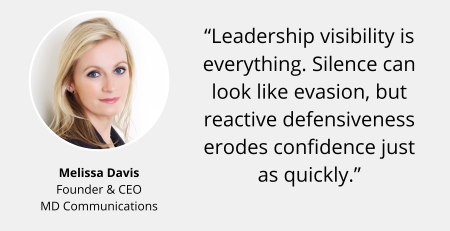Where is your crisis communications plan? It could be that it’s in your head, because it’s obvious to you what should be done and said when your business is disrupted. Maybe you think your business isn’t ‘big’ enough or as entire countries go into apparent ‘lockdown’, it might even feel like you’re missing the point or risk sounding flippant in thinking about your communications plan while people are being affected at a very real and human level.
The reality is that, you definitely do need a crisis communications plan, and you need it written down. This isn’t about indulging in self-important theatrics, it’s just common sense. As should be obvious, if the plan is in your head, what happens if you are ill and unable to enact it? Someone else needs to do it – and they’ll need to work from a considered document that’s been written down.
Ideally, it’s been role-played fairly recently but written down is the bare minimum. From an internal communications perspective, are you communicating with your staff and colleagues? They are the lifeline of your business, and are likely to be feeling uncertain about what lies ahead and indeed, what protocols are to be put in place.
What is a crisis?
This communications plan is like any other crisis plan. You need to decide what would count as a crisis – you are about to start behaving in a different way and saying different things. Deciding what counts as a crisis also helps you with an important part of this plan – deciding when the crisis is over.
Who’s in charge?
In any crisis you need a crisis team. In a small organisation, its members may wear more than one hat, but the roles are still the same. You need someone who has the authority and the means to get relevant information for the group (such as who is ill). You need a logistics person and a person with access to what work is promised and when and you also need one voice that is ‘in charge’ when you make statements and who works with your communications person.
Care for your people
Whether staff are ill, or can’t be in because schools are shut, you can’t be so distracted that you don’t check you are doing what you should to show you care. If you don’t, this will be remembered long beyond the crisis – harming your business in the future.
Internal communications is key
You will need to say things for an external audience where they are affected by your crisis, or think they might be. But internal communications could be much more important. Tell people what you can, and carry on keeping them up to date – even if there is nothing new to say, this is important. They will cope better if they think you are on top of the situation and they know there is a process and plan in place.
And don’t forget, your staff and partners will inevitably be communicating externally too – to family, friends, clients and contacts. You can’t stop that, but if they have information from you that they can respect and believe, then that is what they will use.
Social media during a crisis
You may have just one staff member in charge of managing social media channels for your business, but for a crisis it’s best to plan for a small team to assist. For example, appoint one person to post updates, and another to answer questions from the media as well as to fact-check information and correct rumours.
If you schedule posts using a management tool such as Hootsuite or TweetDeck, make sure you check and edit or delete these as appropriate so as not to harm your company’s reputation by coming across as flippant or uncaring with an ill-timed post.
Communications is two-way
You aren’t just ‘broadcasting’ during this crisis. Information will come your way too. If it is useful, acknowledge that and thank people. Make sure relevant communications from them are fed into your crisis team.
Compassion first
Nothing matters more than people. You may think that’s obvious, and therefore doesn’t need saying – but you should say things that recognise this whenever it’s relevant. People expect it, and it sets the right tone.
So stay well and good luck. Play a crisis straight – be calm, show compassion, avoid humour. And above all, don’t forget to communicate. If you’d like some advice on this, and insight in to how other people plan for and handle the communications around a crisis, I hope you’ll get in touch.












